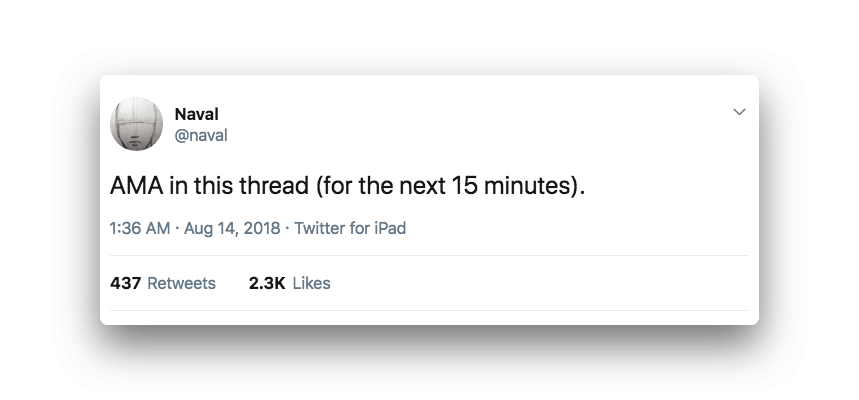Naval Ravikant is a source of truth for me (and an excellent follow on Twitter). Shane Parrish calls him a “deep thinker who challenges the status quo” and this can be felt through his words.
I followed Naval a while back and (thanks to the timeline algo) vastly improved the quality of content on my Twitter feed.
About Naval
Naval is an avid reader and listening to him is almost like reading one hundred books at once (If you have not heard Shane and Naval’s conversation on The Knowledge Project, do it now).
Podcast appearances are rare, but Twitter threads surface frequently. His most recent offered so many thought-provoking tidbits I made this post to save for later.
I picked out some of my favorite responses on advice to younger self, thinking, time vs money, relationships, reading, stress, and health.
Enjoy!
👇 👇
Advice to Younger Self
Q: “I’m starting my first year in college next week; how do I maximize the next four years?”
A: Study what you can’t learn as easily on your own (STEM). Build something as part of a small team and outside of classwork. Make lifelong friends. Find an athletic activity that you love for its own sake. Avoid crowds, their activities, and their recently fashionable beliefs.
Q: “One skill that a twenty-something should pick up today?”
A: Learn to code.
Q: “If you were just starting out in your 20’s today, what would you do differently?”
A: More patience, more presence, less anxiety.
Q: “If you could go back and tell your younger self one thing what would it be, and why?”
A: Relax. You’ll live longer and perform better.
Thinking
Q: “How do you know when to be patient vs. when to be impatient?”
A: Impatience with actions, patience with results.
Q: “What do you do to keep sane if your model of reality is not making sense?”
A: Just change it. “Strong opinions, loosely held.”
Q: “How does one develop a unique view on life?”
A: Don’t listen to others.
Q: “What truths did you discover that shaped your worldview?”
A: There are no adults.
Time
Q: “What’s the worst way you wasted a lot of your time?”
A: Meetings, conferences, traveling for business, staying in relationships that I knew weren’t forever.
Q: “How do you wish you spent your time ten years ago?”
A: Time is the ultimate currency and I should have been more tight fisted with it.
Q: “Would you rather have more money than time, or more time than money?”
A: You can always convert time to money.
Relationships
Q: “Do you have a philosophy for friendship vs. acquaintance?”
A: If you can’t see yourself working with someone for life, don’t work with them for a day.
Q: “Best piece of business advice you wish you had prior to it all?”
A: Keep an incredibly high bar for who you work with.
Q: “How do you say no gracefully?”
A: Be honest. Your social circle will sort itself out.
Q: “What’s the difference between Alone & Lonely?”
A: Alone is a fact, lonely is a choice. We are so afraid to be alone that we end up lonely. The ability to be alone without being lonely is a superpower.
Reading
Q: “Can you actually become smarter? How?”
A: Read what you love until you love to read.
Q: “What’s the best way to absorb/retain information from books you read?”
A: Explain it to someone else or tweet about it.
Q: “What is your intention when you read books/articles/blogs?”
A: None, intentions get in the way of observation. But I enjoy and tend to stick to concise, clear, and simply written things that teach me something new.
Stress
Q: “How to stay positive during debilitating sickness?”
A: This is your opportunity for internal exploration and growth. “Every man has two lives, and the second begins when he realizes he has only one.”
Q: “What’s best way to handle serious/extreme setbacks (facing health catastrophe with dad)?”
A: Read philosophy, try yoga, meditation. These are old (Lindy) solutions.
Q: “What do you do if you get stressed out and want to regain focus?”
A: Caught in a funk? Use meditation, music, and exercise to reset your mood. Then choose a new path to commit emotional energy for rest of day.
Health
Q: “Is physical health or mental health more important?”
A: Both, but mental is the one that you have more control over and can continue to improve as you get older and older.

You can view the entire thread on Twitter